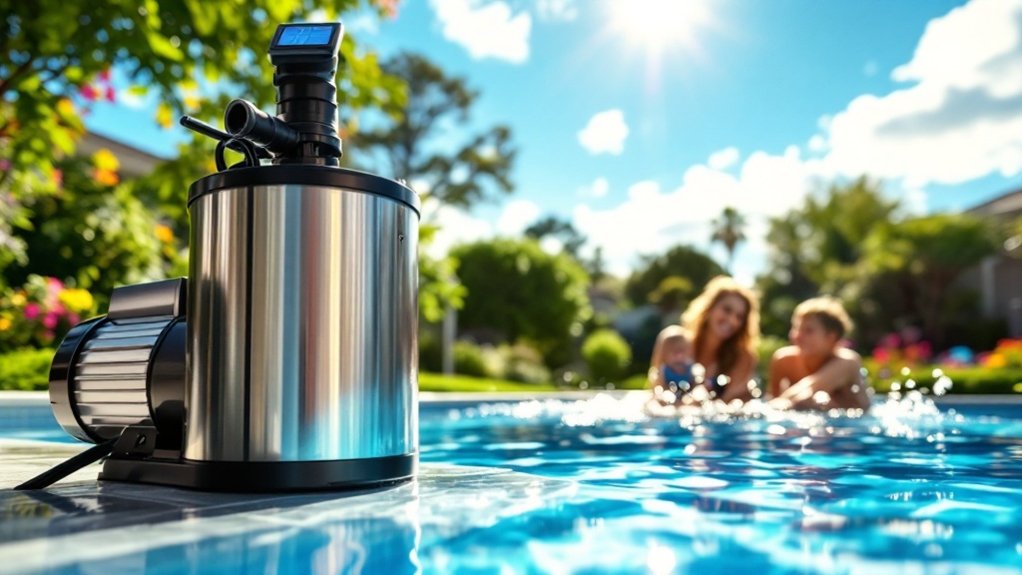The debate between biodegradable pool cleaning products and traditional choices has gained traction in recent years. With increasing awareness of environmental issues, many consumers are reconsidering their cleaning options. Traditional cleaners often contain harmful chemicals, raising concerns about their impact on health and ecosystems. Meanwhile, biodegradable alternatives promise a safer, eco-friendly solution. However, questions remain about their effectiveness and practicality. What factors should consumers weigh when making this important decision?
Understanding Biodegradable Pool Cleaning Products
Although traditional pool cleaning products often contain harsh chemicals that can harm the environment, biodegradable pool cleaning products offer a more sustainable alternative. These products are formulated with natural ingredients that break down easily, minimizing their ecological footprint. Biodegradable cleaners typically utilize plant-based surfactants, enzymes, and other organic compounds, making them safer for both swimmers and aquatic life. Additionally, they are designed to effectively remove dirt, debris, and contaminants without leaving harmful residues. The adoption of biodegradable options reflects a growing awareness of environmental concerns among pool owners. As more consumers seek eco-friendly solutions, the market for these sustainable products continues to expand, promoting cleaner and safer ecosystems while maintaining pool hygiene. Consequently, biodegradable pool cleaning products represent a significant advancement in pool maintenance.
The Environmental Impact of Traditional Pool Cleaners
The use of traditional pool cleaners poses significant environmental challenges due to their chemical compositions. Many of these products contain harsh chemicals, such as chlorine, phosphates, and synthetic surfactants, which can contaminate water sources and harm aquatic ecosystems. When these substances are released into the environment, they can disrupt local flora and fauna, leading to biodiversity loss. Additionally, runoff from pools treated with these cleaners can pollute nearby rivers and lakes, resulting in toxic conditions for aquatic life. Traditional pool cleaners may also contribute to air pollution, as volatile organic compounds (VOCs) evaporate into the atmosphere. As awareness of these issues grows, the demand for eco-friendly alternatives becomes increasingly critical in promoting environmental sustainability.
Effectiveness Comparison: Biodegradable vs. Traditional
Many pool owners wonder about the effectiveness of biodegradable pool cleaning products compared to traditional options. Research indicates that while biodegradable cleaners can be effective in maintaining pool hygiene, they may not always match the potency of their chemical counterparts. Traditional cleaners often contain strong, synthetic chemicals that provide rapid results in eliminating algae and bacteria. However, biodegradable products utilize natural ingredients, which may require more frequent applications to achieve similar cleanliness levels. Additionally, the performance of biodegradable options can vary based on water conditions and types of contaminants present. Ultimately, the choice between biodegradable and traditional products may depend on individual priorities, such as environmental concerns versus immediate cleaning efficacy.
Health Implications of Chemical Pool Cleaners
Chemical pool cleaners, while effective in maintaining cleanliness, raise significant health concerns for users. Many of these products contain harsh chemicals, such as chlorine and bromine, which can lead to respiratory issues, skin irritations, and eye discomfort. Prolonged exposure may exacerbate asthma and contribute to allergic reactions. Additionally, chemical runoff can contaminate nearby water sources, posing risks to aquatic life and potentially endangering human health through the food chain. Children and pets are particularly vulnerable to the adverse effects of these substances, as they often spend more time around pools. Consequently, it is essential for pool owners to weigh the health implications of chemical cleaners against the benefits of using biodegradable alternatives that offer safer, environmentally friendly solutions.
Cost Analysis: Biodegradable Options vs. Conventional Products
While conventional pool cleaning products may appear to be more cost-effective upfront, a thorough cost analysis reveals that biodegradable options can provide long-term savings and benefits. Biodegradable products often come with lower environmental costs, reducing the need for expensive remediation efforts in case of chemical spills. Additionally, they can minimize health-related expenses, as using safer products may lead to fewer health issues for users. Over time, the longevity of biodegradable solutions can also contribute to savings, as they can be effective with smaller quantities. Although the initial purchase price of biodegradable cleaners might be higher, users may find that the reduced impact on health and the environment ultimately leads to lower overall costs, making them a worthwhile investment.
User Experience and Ease of Use
User experience with biodegradable pool cleaning products hinges on the effectiveness of different application methods and their overall cleaning efficiency. A comparison of these methods reveals variations in convenience and results, impacting user satisfaction. Evaluating how these products perform in real-world scenarios is essential for understanding their practicality.
Application Methods Comparison
How do different application methods for biodegradable pool cleaning products impact user experience and ease of use? The versatility of application methods, such as spray bottles, granular formulations, or concentrated liquids, considerably influences user satisfaction. Spray bottles offer convenience and precision, allowing users to target specific areas with minimal effort. In contrast, granular products may require additional steps for mixing or dispersing, potentially complicating the process. Concentrated liquids often demand dilution, which can be a hassle for some users. Additionally, the ease of measuring and handling varies across methods; simpler applications tend to foster positive experiences. Ultimately, consumers may prefer biodegradable options that streamline the cleaning routine while maintaining effectiveness, highlighting the importance of user-friendly application methods in the selection process.
Cleaning Efficiency Assessment
Evaluating the cleaning efficiency of biodegradable pool cleaning products reveals significant insights into user experience and ease of use. Users often report that these products perform comparably to traditional options, effectively removing dirt and debris. However, the time required for visible results can vary, with some users noting that biodegradable solutions may take longer to show effectiveness. Additionally, the application process tends to be straightforward, with most products designed for easy integration into existing cleaning routines. The pleasant scents of some biodegradable options enhance the user experience, contrasting with the harsh chemicals found in traditional cleaners. Ultimately, while cleaning efficiency is essential, the overall user experience with biodegradable products tends to be positive, promoting a more environmentally friendly approach to pool maintenance.
Making the Right Choice for Your Pool and Values
When selecting biodegradable pool cleaning products, evaluating their environmental impact is essential for eco-conscious consumers. Additionally, comparing the effectiveness and efficiency of these products can influence decisions that align with personal values. Understanding both aspects helps pool owners make informed choices that benefit both their pools and the planet.
Environmental Impact Assessment
As the demand for eco-friendly solutions rises, evaluating the environmental impact of pool cleaning products becomes essential for conscientious consumers. Traditional cleaning agents often contain harmful chemicals that can leach into water systems, disrupting aquatic ecosystems and contributing to pollution. In contrast, biodegradable pool cleaning products are formulated to break down naturally, considerably reducing their ecological footprint. These products are typically derived from renewable resources, minimizing reliance on fossil fuels and decreasing greenhouse gas emissions. Additionally, they are less likely to harm wildlife or contaminate local water supplies. By choosing biodegradable options, consumers not only protect their immediate environment but also align their purchasing decisions with broader sustainability goals, fostering a healthier planet for future generations.
Effectiveness and Efficiency Comparison
The choice between biodegradable pool cleaning products and traditional alternatives not only impacts the environment but also raises questions about effectiveness and efficiency. Traditional cleaners often contain potent chemicals that deliver rapid results, effectively removing algae and grime. However, these products can pose risks to both aquatic life and human health. In contrast, biodegradable options typically use natural ingredients that may require more time and effort to achieve similar results. While some users report satisfactory outcomes with these eco-friendly alternatives, others may find them less powerful. Ultimately, the decision hinges on individual values—whether prioritizing environmental sustainability over immediate cleaning performance or vice versa. Pool owners must weigh these factors to align their cleaning choices with their principles and maintenance needs.
Frequently Asked Questions
Can Biodegradable Pool Cleaners Cause Foaming or Cloudiness in Water?
The question of whether certain cleaning products can cause foaming or cloudiness in water is significant. It is essential to note that some biodegradable cleaners may produce such effects, depending on their specific formulation and ingredients.
Are Biodegradable Pool Cleaning Products Safe for Pets and Wildlife?
The safety of biodegradable pool cleaning products for pets and wildlife largely depends on their specific ingredients. Generally, many formulations are designed to be less harmful, but caution is advised to guarantee no adverse reactions occur.
How Long Do Biodegradable Cleaners Take to Break Down?
The time required for biodegradable cleaners to break down varies considerably, typically ranging from weeks to months, depending on environmental conditions such as temperature, moisture, and microbial activity, influencing their decomposition rate and effectiveness.
Do Biodegradable Options Have a Shorter Shelf Life Than Traditional Cleaners?
The question of shelf life arises frequently in product comparisons. Typically, biodegradable options may have a shorter shelf life due to natural ingredients, while traditional cleaners often contain synthetic preservatives that extend longevity.
Can I Use Biodegradable Cleaners in Saltwater Pools?
The compatibility of biodegradable cleaners in saltwater pools depends on their formulation. Some products may be effective, while others could react negatively with saltwater systems, potentially affecting both performance and water quality. Researching specific products is essential.
Conclusion
To summarize, the choice between biodegradable pool cleaning products and traditional options hinges on individual values and priorities. While biodegradable cleaners offer an environmentally friendly alternative with reduced health risks, they may require more frequent applications and can sometimes fall short in effectiveness compared to conventional products. As consumer demand for sustainable solutions grows, the evolution of biodegradable cleaners may lead to improvements in both efficacy and convenience, ultimately shaping the future of pool maintenance.




